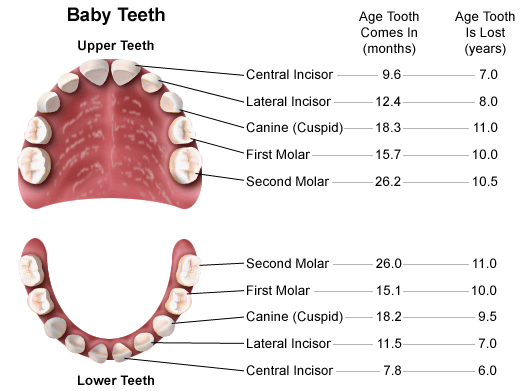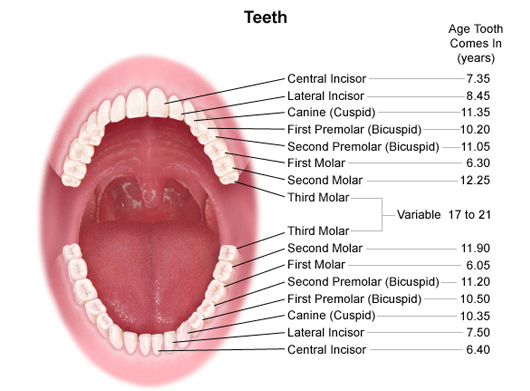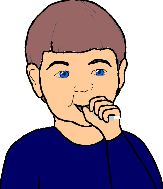
With your help, your child can have a lifetime of healthy smiles!
Early dental care gets a child accustomed to a clean cavity free mouth. Because children become accustomed to clean teeth they will continue with the proper habits to ensure this clean feeling in the future as well.
Why should we worry about cavities in baby teeth when these teeth will be replaced by permanent teeth later ?
The answer is that baby teeth serve important functions. Neglect of baby teeth can cause severe problems. Consequently, it is important to make sure that even these "temporary" baby teeth remain healthy and cavity free.
- Healthy baby teeth are crucial in helping the baby learn how to speak properly.
- Healthy and nice looking teeth are important in building self-confidence and self-esteem. This is especially important at such an early age. Unfortunately, small children can be cruel to one another quick to tease peers about ugly looking or decayed teeth. Furthermore, bad breath resulting from poor dental hygiene can make your child an outcast among peers.
- Baby teeth serve as spacers which maintain the proper spacing and alignment of the teeth so that permanent teeth have enough room to come in.
- Baby teeth are important in proper feeding and nutrition. A recent study has illustrated a potential link between the number of cavities a child has and the probability of the child being underweight.
It is crucial to note that the proper care of baby teeth is not only important now but for the future as well.
FREQUENTLY ASKED QUESTIONS When should my child first see a Dentist?
Your child's first visit to a dental clinic must be a pleasant experience. A bad first impression may last a lifetime. The right time to bring a child for a dental visit is before all the primary (milk) teeth have appeared - before the child has completed 2 years of age. This sets the stage for optimal preventive dentistry.
Reasons for an early visit:
- Bringing a child when there is no emergency will make the visit a pleasant experience.
- Parents may not recognize a dental problem in it's early stages.
- Your dentist can prevent problem like decay from occurring
- Advise on nutrition and home care can be provided.
Fear of the dental clinic is learned from personal experience or what a child hears from others. Be completely natural Early dental care gets a child accustomed to a clean cavity free mouth. Because children become accustomed to clean teeth they will continue with the proper habits to ensure this clean feeling in the future as well. With your help, your child can have a lifetime of healthy smiles! when you inform your child about this visit. Make it sound like a routine item. Allow your child to get familiar with the dental clinic. Most important - do not show any anxiety or fear yourself. Children pick-up nonverbal cues very quickly and tend to mirror the emotions of their parents.


Anatomy of Childrens Teeth
Did you know that babies in utero have about 20 teeth already developing? Children's teeth begin forming before birth. As early as 4 but usually 6-7 months, the first teeth to erupt are the lower central incisors, followed closely by upper central incisors. Although 20 milk teeth usually appear by age 3, the pace and order of their eruption varies. Children have two sets of teeth, primary (milk or baby) teeth and permanent teeth. Both sets are important for children's speech, chewing and for appearance. Additionally, milk teeth help in the proper development of muscles for chewing, and they also maintain the space so that permanent teeth can erupt in their correct positions.
From birth to the age of 6 months there are no teeth in the mouth. It is necessary for parents to clean the gum-pads with a soft cloth.
The first tooth appears in your child's mouth at the age of 6 months. Parents are required to begin brushing these teeth to prevent them from decaying. All the milk teeth erupt in the mouth by the age of 2 years. There are 20 milk teeth. Parents must brush their child's teeth, as the child will be unable to do so. The child can gradually be taught to brush his/her own teeth as soon as they have learnt to spit out the toothpaste.
A word of caution: The 6 year permanent molars are often mistaken as milk teeth and neglected. Between the age of 6 and 12 years, a child has both milk and permanent teeth. This is called the mixed dentition stage. Parents of these children often mistakenly think that the teeth, though decayed, do not require treatment and will fall off, as they will be replaced with new teeth.
Teething Myths: Teething does not cause fever and diarrhea! If present it is only a coincidence. At this age, children are very active and tend to put everything into their mouth and nostrils. This contributesto cold and flu like illnesses.
Correcting the Alignment: The age for correction of alignment differs from case to case, but in general, it is best done after the child has completed 12 years and all the permanent teeth have erupted. Many times early commencement of treatment gives better results, but treatment is possible at an older age also. The right person to consult is an orthodontist.
Tooth Decay: Causes of tooth decay in children are the same as in adults, but occurs more quickly. Being very small in size, decay reaches the nerve of a primary tooth very fast and causes pain. Tooth destruction can occur so fast that some parents feel that the teeth were decayed when they first erupted. Remember, teeth can decay only after eruption and not before. Treatment of tooth decay is similar to that for permanent teeth and can involve fillings, root-canal treatment, and/ or crowns. If the child is not cooperative, your dentist may suggest treatment under general anesthesia rather than lose the advantages of treatment. Decay of the primary teeth indicates that the child is susceptible to tooth decay and requires proper attention to maintain a healthy dentition. An important factor in children responsible for causing tooth decay is the child being bottle-fed and put to bed. This type of decay is extensive and is called as nursing bottle caries.
What are space maintainers?A milk tooth usually stays in until a permanent tooth underneath pushes it out and takes its place. Unfortunately, some children lose a milk tooth too soon. If this happens, the teeth beside it may move into the empty space resulting in lack of space for the permanent teeth, leading to crowding. This can be prevented by the use of Space Maintainers. It is more affordable and easier on your child to keep teeth in normal positions with a space maintainer than to move them back in place with orthodontic treatment.
Injuries to Teeth
Are often seen in kids involved in sporting activities. In case a tooth is fractured or is kno-cked out of its socket, the child should be immediately taken to the dentist. The tooth may be pre-served and transported to the dental clinic in a wet medium or milk or kept in the mouth of the child. Under certain (not all) circumstances the dentist may put the tooth back into its original place, making it possible for the tooth to last its intended life-span. Primary teeth that are accidentally knocked out are often not replaced because of risk that the primary tooth will fuse to the socket and require surgical extraction when the permanent tooth erupts. For primary teeth that have been knocked out prematurely it is best to call your dentist for advice.
Habits:Thumb sucking, mouth breathing and tongue thrusting are very often observed in growing children. These habits, if discontinued by the age of 5 years, do not affect the positions of permanent teeth, but if continued beyond this age can cause mal-alignment of teeth. These habits are usually due to a variety of reasons, including psychological. Attempts must be made to pinpoint the cause and treat it to break the habit. If such attempts fail or do not reveal any particular cause, certain habit-breaking appliances A quality product from Famdent Dental Arts fda@famdent.com Comprehensive primary dental care, from birth through adolescence can be constructed by the dentist to be worn by the child to get rid of the habit.

How can the Dentist protect your child's teeth?
As a child's permanent teeth erupt, the Dentist can prevent cavities from forming with the help of sealants and fluoride treatment. Sealants are a safe, painless and low-cost way to help protect your child's teeth from decay. The sealant is bonded to the chewing surfaces of the molars and premolars, and thus prevents these teeth from decay. Fluoride application is a single sitting procedure done once every six months to make the tooth structure stronger and prevents cavities.
Advise to Parents
- The first visit of your child to the dental clinic could be as early as 1 year, but definitely not later than 2 years, to be followed by 6 monthly regular check-ups.
- The child's teeth should be brushed thoroughly twice daily using a fluoridated toothpaste. This brushing has to be done by the parents initially, till the child has mastered the necessary skills.
- Allow the child to eat what he/she likes, but with or immediately after meals. This should be followed by brushing or thorough rinsingof the mouth. These measures will ensure that the food particles are cleared from the mouth, thus reducing the incidence of tooth decay.
- Sealants should be applied onto the biting surfaces of the permanent back teeth as soon as they erupt. This will prevent decay from occurring in the pits and fissures of these teeth.
- Fluoride treatment may be considered if your child has a high incidence of decay, or if the level of fluoride in your drinking water is inadequate.